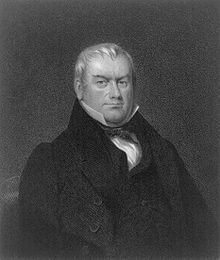George Wolf
George Wolf (born August 12, 1777 in Allen Township , Pennsylvania , † March 11, 1840 in Philadelphia , Pennsylvania) was an American politician and from 1829 to 1835 the seventh governor of the state of Pennsylvania.
Early years and political advancement
George Wolf attended the Allen Township Classical Academy , where he was later a teacher. After studying law, he was admitted to the bar in 1798. Then he practiced this profession in Easton . There he was also head of the post office between 1802 and 1803. Between 1804 and 1809 he was employed by a probate court ( Orphans Court ) in Northampton County .
In 1814 he was elected to the Pennsylvania House of Representatives for one term . After he was not re-elected in 1815, he worked as a lawyer again. He did not return to the political stage until 1824. That year he was elected to the US House of Representatives, where he remained until 1829. In Congress , he chaired a committee to deal with claims from the American Revolution. In the late 1820s, Wolf had joined the new Democratic Party founded by Andrew Jackson . As their candidate, he was elected the new governor of his home state in 1829.
Governor of Pennsylvania
George Wolf took up his new office on December 15, 1829. After re-election in 1832, he was able to officiate until December 15, 1835. During this time the school system in Pennsylvania was improved and standardized. Through this school reform, every child in Pennsylvania received at least a minimum of education and training. Wolf is considered to be the father of the school system in this state, although some of the plans came from his predecessor John Andrew Shulze . In addition to school policy, the state's legislation has been revised. With the help of new taxes, the infrastructure was further expanded, with the construction of the railway now also beginning.
Due to the federal political antagonism between President Jackson and his Vice President John C. Calhoun , there was also a split in the Democratic Party in Pennsylvania. Jackson's supporters were for a strong federal government, while Calhoun's supporters championed state rights. In federal politics, the dispute culminated in 1832 with the nullification crisis between the state of South Carolina and the federal government. Governor Wolf was close to the Calhoun wing, especially since he fell out with the president over his banking policy. Because of this split, Wolf could not prevail in the gubernatorial elections in 1835. In addition to him, the Democrats put up another candidate, Henry Muhlenberg . Because of this fragmentation, Joseph Ritner , the candidate for the short-lived Anti-Masonic Party , managed to win the gubernatorial elections. Therefore, Wolf had to resign from his office in December 1835.
Another résumé
After the end of his governorship, Wolf was from 1836 to 1838 auditor in the US Treasury Department ( Comptroller of the Treasury ). In 1838, President Martin Van Buren appointed him director of customs in the Port of Philadelphia. He held this position until his unexpected death in 1840. George Wolf was married to Mary Erb, with whom he had nine children.
Web links
- George Wolf in the database of the National Governors Association (English)
- George Wolf in the Biographical Directory of the United States Congress (English)
- George Wolf in the database of Find a Grave (English)
- The governors of Pennsylvania (English)
| predecessor | Office | successor |
|---|---|---|
| Thomas Jones Rogers |
United States House of Representatives for Pennsylvania (8th constituency) with Samuel D. Ingham December 9, 1824-1829 |
Peter Ihrie |
| personal data | |
|---|---|
| SURNAME | Wolf, George |
| BRIEF DESCRIPTION | American politician |
| DATE OF BIRTH | August 12, 1777 |
| PLACE OF BIRTH | Allen Township , Pennsylvania |
| DATE OF DEATH | March 11, 1840 |
| Place of death | Philadelphia , Pennsylvania |

